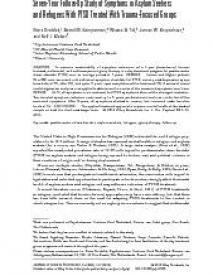Seven-Year Follow-Up Study of Symptoms in Asylum Seekers and Refugees With PTSD Treated With Trauma-Focused Groups
Objective: To examine sustainability of symptom outcomes of a 1-year phase-based traumafocused, multimodal, and multicomponent group therapy in a day treatment program for posttraumatic stress disorder (PTSD) over an average period of 7 years.
Method: Iranian and Afghan patients (N = 69) were assessed with self-rated symptom checklists for PTSD, anxiety, and depression symptoms before (T1), after (T2), and up to 11 years upon completion of the treatment (T3). A series of mixed model regression analyses was applied to determine the course of the measured symptoms over time.
Results: At T2, all symptoms were reduced, but PTSD symptoms showed the strongest reduction. The trend of symptom reduction continued up to 5 years posttreatment and was similar for all the examined symptoms. After 5 years, all symptoms started to worsen, but remained under baseline levels at T3.
Conclusions: The applied treatment appears to improve mental health of the studied sample on both the short and longer term. C . 2013 Wiley Periodicals, Inc. J. Clin. Psychol. 00:1–12, 2013.
Geachte bezoeker,
De informatie die u nu opvraagt, kan door psychotraumanet niet aan u worden getoond. Dit kan verschillende redenen hebben,
waarvan (bescherming van het) auteursrecht de meeste voorkomende is. Wanneer het mogelijk is om u door te verwijzen naar de bron
van deze informatie, dan ziet u hier onder een link naar die plek.
Als er geen link staat, kunt u contact opnemen met de bibliotheek,
die u verder op weg kan helpen.
Met vriendelijke groet,
Het psychotraumanet-team.
In: Journal of clinical psychology, ISSN 0021-9762 | 70 | 4 | april | 376-387
http://doi.org/10.1002/jclp.22035


